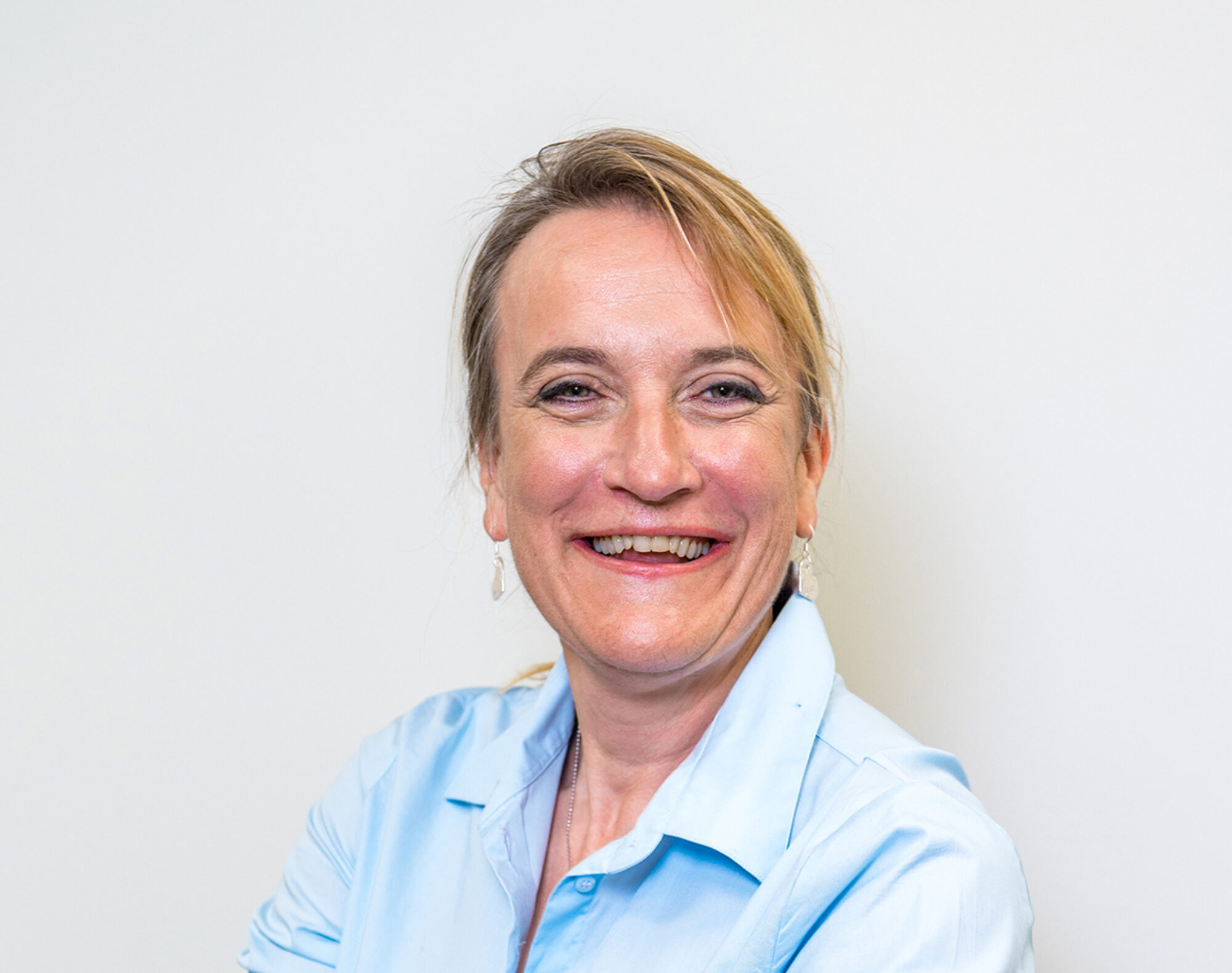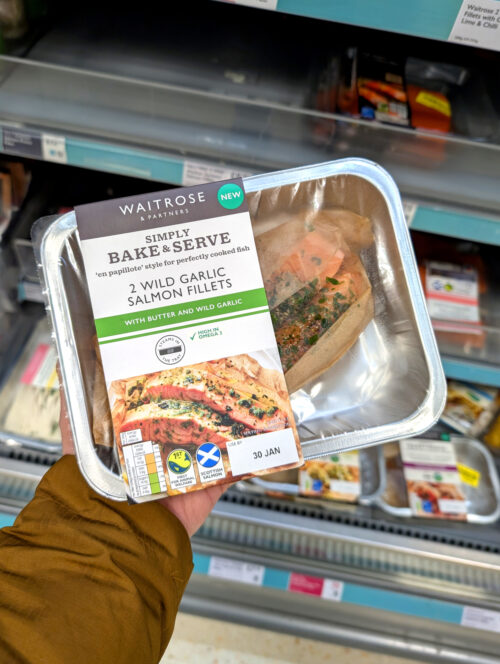
Aquascot launches two new Scottish salmon products at Waitrose
Anne Allen has been Aquascot's Head of Human Resources since November 2015, and has been a driving force in our continuous improvement mission ever since. As Aquascot continues to progress, grow and develop, so too does our approach to people.
We caught up with Anne for a great Q&A chat recently to talk all things HR and more...
It’s been quite a convoluted career path for me. I was born and bred in Moffat in Dumfries and Galloway. Moffat is a small rural village and to start my career meant uprooting myself at the age of eighteen and head off to university. I had the choice to go to Glasgow or London. I decided to go to London, where I spent a very full 22 years in the east end of London where I met lots of different people from all over the world. I went to the University of East London and did a general Business Degree. My favourite module was something called ‘Organisational Behaviour’, which has links to HR.
When I finished university, I didn’t really know what I wanted to do, and ended up doing Technical Sales for 4 years, mainly in the automobile industry – working with Lotus, Ford, and BMW to supply prototype resins used in the design of new cars.
I then realised it was high time for me to make a career change as I was approaching 30 and was tired of driving endlessly on the M25. I took a significant pay drop and started my HR career right at the bottom as an HR Assistant, working for a recruitment company, which specialised in recruiting doctors, social workers and teachers from abroad, however my client base was mainly recruitment consultants. That business was about 150 people, based in East London, and that’s where I cut my teeth in terms of HR.
Very early on in that job, I was given a huge opportunity as the HR Manager left, and I was asked to step into that role – on the provision from my point of view that they would sponsor me and would give me the right support in terms of qualifications. I spent 5 years in that business and within that time, I worked really hard and got my Postgraduate Diploma and then my Master's Degree, which is your ticket in order to practice all things HR, and subsequently became a Board Member of that business.
I then miraculously had a baby! That was very unexpected, as I was told I couldn’t have children – that was just a huge gift that we were given and still is. I went off on maternity leave and when I came back, the business was quite different. In the meantime, the business had been sold to a large corporate group, whose way of working wasn’t my way of working; I didn’t like the way they treated their people, so I decided to leave. And at that point my husband and I had realised that we wanted a better quality of life for our son, so we moved to Inverness.
My first job in the Highlands was working for a company called Sommerfield who were at the time a significant food retail business. I was accountable for 23 stores from Aberdeen all the way across to Orkney and Shetland and Skye. I was there as a Regional HR Manager, working with the Ops Directors and that covered everything – case management, policies, transfers, learning and development, and developing relationships with their equivalent of the Partnership Council. I loved that job, and it was very much exposed to retail which is very fast-paced: you have to land things first and first time only. That business sold to The Co-operative Group, so we were all offered voluntary severance, which I took.
I then worked for Scottish Natural Heritage for just over a year, based in Inverness. It was supposed to be a temporary job, but I was offered a permanent role and promotion to the role of Senior HR business partner. However, even though I care about the environment which I understand, public sector working is not my forté. I find it’s not fast paced enough, so I decided to move from that role and went from one extreme to the other.
I then went to work for a major food brand based in Fochabers. I was the HR Manager there, dealing with about 800 employees, across 3 sites. They had huge cultural issues and the commute was becoming quite challenging. I did that for a year and it gave me a good idea of the challengers that can occur in manufacturing. I’m a very values-driven person, and if my values are at odds with the business, then it's time for me to leave because life’s too short.
I left and then worked for Sainsbury’s, mainly the newly opened Nairn branch, and again it was retail, which I was very familiar with. I was an HR Manager in that role, however they made all the HR Managers redundant because they centralised their HR function into a call centre in Manchester as part of their national cost savings strategy.
I’m a great believer in terms of what comes your way. A job came up working for CalMac ferries, it was a cover for Maternity Leave. I had the Inner Hebrides region – Oban, Skye, Mull, Coll, Rum, Egg and I saw some incredible parts of Scotland that I had never ever seen before. I met some amazing people, and also some eccentric people as you can imagine, dealing with islanders who have their own unique ways of working!
That was really refreshing, and I did that for two years. The contract was extended for another year because I was specifically looking at group pensions changes. I got a real ‘baptism of fire’ in terms of trade unions — they had 4 trade unions, all with different needs and different agendas, and there were also links with the Scottish Government. It was public sector work, but of a different kind.
The contract finished and it just so happened that the HR Manager role came up at Aquascot. That was November 2015, and I’ve been here since, and the role has expanded in that of the Head of HR. At that time, when I came into the business, they had no HR function, no understanding of what an HR function does, and two really willing people in the team – Joanne (Brogan) and Stacey (McFarlane), with no real job roles apart from covering payroll. My first year was spent establishing the team. We also had to make sure we were compliant in terms of legals, so an awful lot of effort was put into that. It needed all three of us to work together and Stacey and Joanne were up for the challenge and since then have continued to flourish.
When Stacey went on maternity leave, Deborah (Thomasson) joined the team, and thankfully continued in the business upon Stacey’s return and and has been a great asset, providing a different dynamic to the team. We as the HR team are never going to win any popularity contest; however we do an incredible amount of hard work in the background to support a wide range of partners, to ensure not only we are legal but to also provide a level of fairness and consistency across the business, while trying to be actively kind, not an easy task when dealing with folks who are quite complex and unique!
I was then offered the opportunity to take on the Health & Safety (H&S) function, with Sylwia (Robertson) and Patrycja (Cisewska), who have just flourished and grown, and do an amazing job especially during the pandemic. H&S has a huge level of accountability in terms of welfare within the business, which sits firmly with me and the broader Leadership Team (LT). Since then, it’s really been about building a platform of maturity within the business, heavily linked with employee ownership. I would say it all comes down to developing our teams, moving away from silo practices, and hiring folks who share our values...
I’ve got a fantastic team. I can’t tell you how proud of them I am, and they’re all great women that come through the ranks, who have have taken on the responsibility of developing themselves to the point all have formal transferable qualifications and in my opinion are in a better place than what they started with me, and that to me is absolutely critical in terms of succession planning and legacy.
I think the moral of the story is, don’t be afraid to go out and try things, because you can always change it, and this approach has provided me with a wealth of experience – some great experience in terms of things that really shouldn’t happen, but more importantly some great examples of things that have gone really well. You can bring that back to whatever employer you’re working for. Personally, it’s important that I enjoy my job and I have to make sure that people around me also enjoy it.

Anne Allen, Aquascot Head of Human Resources
My role is quite varied, it’s very broad. In the H&S team, Sylwia has just finished her Diploma in NEBOSH and Patrycja her Certificate in NEBOSH, both are or have undertaken Leadership Training. I am the Chair of the Wellbeing Committee (which meets monthly) where we review any accidents and incidents, seeking root causes with a view of implementing new ways of working to try to reduce the level of accidents occurring in the workplace. The core principle is to ensure that all partners who arrive for work leave safely and return home to their families after their shift is complete.
The H&S team are also responsible for risk management within the business, so that’s about any new machinery that comes in, to make sure that Risk Assessments and standard procedures are covered. COVID has had a massive impact on the team – having to change and alter a lot of processes and risk management in order for us to remain open. We also cover things like operating procedures, the legals, training matrices, First Aid, and fire wardens to name but a few. They are also heavily involved with Scottish Vocational Qualifications (SVQs), as well as the Partnership Council (PC) and other projects like healthy eating, charity, translation, and the Common Language Project. They’ve got quite a wide remit!
In terms of the HR function, we’re here to ensure there is fairness and consistency across the business primarily. We’re also there to support managers, and this is ‘work in progress’ to make sure that we support and not do the work for them. We cover things like absence management, which includes occupational health referrals. The whole of the Welfare team are trained as Mental Health First Aiders, including myself. We’ve been heavily used over the last year due to partners' home life affecting their welfare, much of it impacted by COVID. We also cover things like case management, that’s your disciplinaries and grievances – to make sure that we have no disparities across the sites.
We’re also are custodians of the partner handbook: we create and change policies depending on legal updates and feedback via the PC from partners. A recent example of policy change was the Bereavement and Compassionate Leave Policy – that came as an aspiration from Joanne (Brogan) and the PC, which then was discussed. We widened the remit of the Compassionate Leave, so it’s more open to partners, it’s not segmenting people by the relationship they have with individuals, and that linked with the Cultural Group, which I’m also part of. Through the Cultural Group, it was agreed across the ‘Group’ to adopt the new policy. The next one that we’ll be looking at is the Maternity and Paternity Policy.
We’re also here to ensure that we remain legal in terms of the employment law, which is an ever evolving, changing scene and always will be, and when you’re dealing with employment law, you’re dealing with shades of grey, which makes it problematic, but also challenging.
We also cover payroll, pensions, benefits, things like death in service, and the Cycle to Work scheme. We deal with recruitment, from agency all the way through to senior roles. We’ve just completed the recruitment for Simon Fowler, the new Chair of the Aquascot Board, which involved the PC and Leadership Team working effectively together. We’ve altered our recruitment to make it more inclusive, to have as many opinions and voices involved, especially for key roles. We’ve got resource issues, as we know, with Brexit and COVID, so that is ongoing and we need to get better about how we bring people into the business, which will require a different mindset in terms of reaching out to school leavers, modern apprenticeships. job share, and increased part-time working.
I also deal with learning and development, at a strategic level. So we’re not talking about specific things for mandatory departments – but wider, for example the current Leadership Training programme, to support the PC with bespoke programmes, to professional qualifications, apprentices, and coaching. I specifically wish to mention coaching because we’re trying to move to a coaching culture, which is going to take some years. We’re heavily investing in people, and we will continue to do so. That’s one of the reasons why we won the SCDI Awards for People Development, which is a testimony to not only me but all the departments and the Leadership Team.
What else? R&R, Reward and Recognition. This is to make sure partners’ contributions are recognised across the whole of the site. Stacey and I have a role to play to make sure there is fairness and trust within that relationship, so we sit in all of the R&R meetings.
I’m also part of the Aquascot Trust Cultural Group, which is led by John (Housego), the PC and the Group Directors. I am accountable for the Aquascot Cultural journey in terms of capturing all our current and future activities over the next 5 years, which involves some informed guess work.
I’m also accountable for the 'Group' – we work as the Group HR function across Bay Foods, Shore and IHCT. Investment Holding Company of the Trust (IHCT Ltd) was formed to lead the diversification strategy of Aquascot, and has the responsibility for all new businesses, two of which are the start-ups New Wave Foods, creators of the Shore brand seaweed business, and Bay Foods, a provider of high quality frozen meals and puddings under the brands of Highland Bay, The Scottish Food Company and The Highland Cookhouse.
A lot of my team are involved with an awful lot of work outside of the normal HR remit too. Joanne is leading the Charity Group, which they are all a part of; Patrycja and Deborah sit on the Partnership Council and the Great EO Strategy Group; Stacey played a major part in the Microsoft 365 roll out, and she’s also looking at a new payroll system in time and attendance. Patrycja and Sylwia are responsible for translation tasks, and of course the induction work.
The first Leadership Training session started in January of this year, and this was aimed at the broader Leadership Team. So this was for people who had accountabilities for folks – people that they had to manage –it was mainly centered on the ‘soft skills’. This is about how you delegate, this is about how you communicate, this is about knowing yourself better.
Partners were asked to complete a Myers-Briggs personality test, which tells you about your type of personality and what your preferences are, and how you work with others. And it explains why you work well with others and not so well with some others.
It was a six-month course with modules every month, and there was the opportunity to do the Higher-Level Qualification for those who wanted that, which sits just under a Degree level. The feedback from that group was very positive, so it’s created a peer group for them to work more effectively together.
What we’re going to do is we’re extending that, we’re going to ask that group to do a project on ‘Ways of Working’, so this is about cross-functional working – how do we get rid of those snagging areas – for example, what does Technical do, what does NPD do, what does Production do, where do they crossover, where is the issue, how does that get sorted out. It’s a great project and a live one. We’re also asking that first cohort to go through a coaching workshop – this goes back to how we want to change from a command-and-control type of management style to a coaching style, which brings much more benefit to all the individuals involved.
These people will have the opportunity to coach the second cohort of leaders that are coming through, who do not necessarily manage people directly, but we believe to invest in them because they are potential leaders of the future. We’ve changed the course slightly – it’s less about how to manage teams and more about how they manage themselves, and how they influence others – but the core aspect will remain the same. The expectation is, once the second tier is finished, they will also coach the next tier that’s coming through, because we just want to continue this and expand this further. It helps with our cultural journey, and also upskills people on behaviours rather than just skills.
Externally, I’m part of the Scotland for EO Group. We’re trying to create a platform where anybody who wishes to become an EO business knows what a learning and development process looks like, and that’s linking with Skills Development Scotland and Scottish Enterprise.
I’m also part of SIBL, which is a Scottish leadership development group. We have seminars where we discuss issues that are happening in anybody’s business, and get insight from others who have a wealth of experience.
I’m also part of the newly opened Scotland HR hub, which is run by Scottish Enterprise. This talks about all topics hot in the HR remit, which the current one is hybrid working and resource issues.
Lastly, I’m part of the Waitrose Modern Slavery Group. This is where all the protein suppliers get together to make sure that as much as we can, modern slavery is not run through any part of the supply chain. We’ve just asked all of our fish suppliers to complete a self-assessment based on ethical trading, and thankfully there is very low non-compliance, but it is still a significant part of my role. We’ve just updated our Modern Slavery Statement, which is available on our website to capture all our key activities that are extensive.
Interviewed by: Justine Fourny (Category & Marketing Officer)

Aquascot launches two new Scottish salmon products at Waitrose

Introducing Our New Summer Dish: Fresh Pesto Filled Scottish Salmon Fi...

Aquascot is excited to announce our involvement in the new 'Simply Bak...

Aquascot has appointed Fred Bowden as Chairman of the Aquascot Board, ...